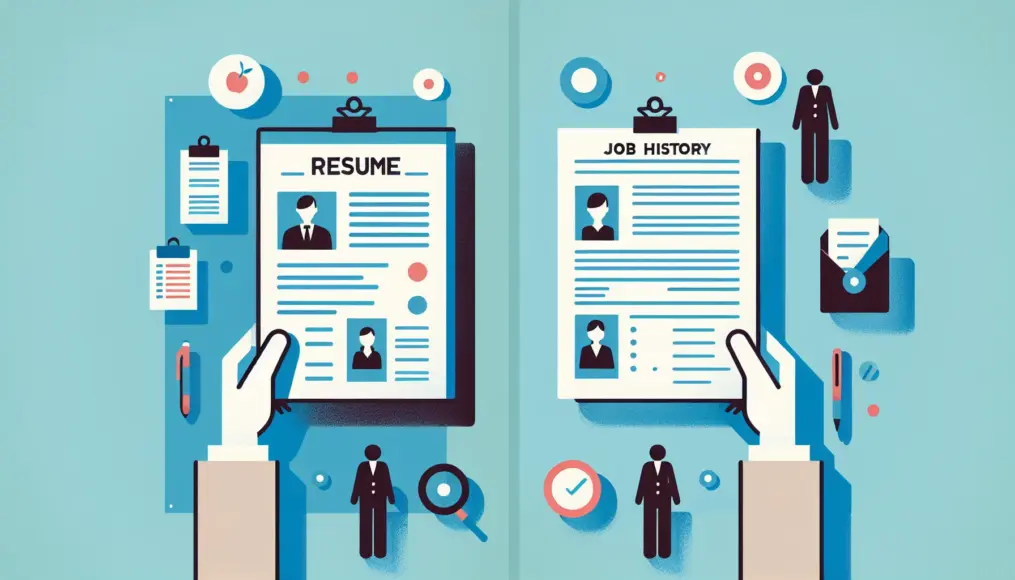Understanding the difference between a resume and a CV (curriculum vitae) is crucial when navigating your job search. While these documents may seem similar at first glance, they serve distinct purposes and have different roles in showcasing your professional background. By knowing how to differentiate between them, you can effectively highlight your strengths, ultimately expanding your chances of landing that job.
In this article, we’ll break down the fundamental differences between a resume and a CV. We’ll also share tips on how to craft each document effectively and discuss which one to use in various situations. Packed with insights to help you succeed in your job search, this is definitely worth reading until the end.
- Explanation of the key differences between a resume and a CV
- Tips for creating effective self-promotion and work history
- Suggestions for usage based on different situations
The Key Differences Between a Resume and a CV
When it comes to job hunting, resumes and CVs are crucial documents. However, many people often confuse the two. A resume generally serves as a summary of your basic information, education, and work history, acting as an introduction to yourself for potential employers. On the other hand, a CV (Curriculum Vitae) provides a detailed account of your job responsibilities and achievements, making it an essential tool for showcasing your skills and experience.
Understanding the differences between these documents allows you to prepare the appropriate materials for your job search and effectively promote yourself. Knowing the purpose and content of each is the first step towards a successful transition to a new job.
Purpose and Content of a Resume
The primary purpose of a resume is to convey who you are to potential employers. Typically, a resume includes your name, contact information, education, work history, qualifications, and a personal statement. This allows hiring managers to grasp your basic information and assess whether you are a good fit for their needs.
A resume should be concise yet effectively communicate your strengths and unique qualities. It’s crucial to accurately detail your background and make sure there are no typos or errors.
- A resume is a document that summarizes your basic information
- It serves as an introduction to yourself for employers
- Clear and concise information is essential
The Role and Importance of a CV
A CV is designed to provide a detailed overview of your job experiences and accomplishments. Typically, it includes specific job responsibilities, achievements, skills, and project details. By explicitly demonstrating your capabilities and successes, a CV can leave a stronger impression on potential employers.
CVs are particularly important when applying for positions that require specialized skills or experience. They help hiring managers easily determine if you are the right fit for the role.
- A CV shows specific job responsibilities and achievements
- It’s an important document for showcasing your abilities
- Especially crucial when applying for specialized positions
Key Points for Writing a Resume
When creating a resume, it’s essential to keep several key points in mind. One of the most important aspects is the self-promotion section, where you have the opportunity to showcase your strengths and personality. How you present yourself can significantly influence the impression you leave on hiring managers. Additionally, including the right basic information in your resume is crucial. By understanding and effectively summarizing these elements, you can create a more favorable impression.
In this article, we’ll delve into effective ways to write your self-promotion section and outline the essential information that should be included in your resume. We’ll provide specific tips on how to present this information, along with important considerations to keep in mind, so be sure to take notes!
Writing an Effective Self-Promotion Section
The self-promotion section is a critical part of your resume where you can highlight your strengths and unique qualities. Start by reflecting on your experiences and skills, identifying what you excel at. Then, connect your strengths with the skills or traits that the company you’re applying to values.
Ideally, your self-promotion should be impactful even if it’s brief. Incorporating specific anecdotes can illustrate how you can contribute, making your case much more persuasive. Aim to express yourself genuinely, using your own words to convey who you are.
- The self-promotion section is key to showcasing your strengths.
- It’s important to reflect on your experiences and skills concretely.
- Connect your strengths with the skills sought by the employer.
Essential Information to Include in Your Resume
Your resume needs to contain fundamental information. Begin with the basics: your name, contact details, educational background, and work history should all be accurately recorded. Pay particular attention to ensuring that your contact information is correct. Additionally, when listing your education and work experience, it’s standard practice to present the most recent information first.
Don’t forget to include any relevant qualifications or skills as well. This helps hiring managers easily understand your abilities and background. Remember, your resume is a vital tool for expressing who you are, so take the time to craft it carefully.
- It’s crucial to provide accurate basic information.
- List education and work history starting with the most recent.
- Include all relevant qualifications and skills.
Tips for Crafting an Impressive Resume
A resume is a crucial document that communicates your work experience and skills in detail. Unlike a traditional CV, a resume allows for a deeper dive into your specific job responsibilities and achievements, requiring clearer and more detailed expressions. This helps hiring managers understand what you’ve done and the value you can bring to their organization.
In this article, we’ll explore how to write an effective resume and highlight your achievements. By keeping these points in mind, you can create a compelling resume that increases your chances of landing an interview.
How to Write Your Work Experience
When detailing your work experience, it’s important to be specific. Start by clearly stating your job title, the company name, and the duration of your employment, then follow up with a description of your responsibilities. Focus on what roles you played and the projects you were involved in.
In addition to your duties, it’s essential to showcase the skills you utilized and the results you achieved. Providing concrete numbers and outcomes will make your claims more persuasive.
- Clearly state your job title, company name, and employment duration
- Focus on specific job responsibilities
- Use numbers to demonstrate skills and achievements for added impact
How to Showcase Your Achievements
Your resume should effectively highlight your accomplishments. Be sure to detail successful projects you were part of and the improvements you contributed to. This allows hiring managers to understand your work outcomes clearly and envision how you can contribute to their team.
When promoting your achievements, using specific figures and data is key. For example, phrases like “increased sales by 20%” or “completed the project three months ahead of schedule” convey your capabilities effectively.
If you found this article interesting, you might also appreciate our detailed guide on writing effective job descriptions in your resume, available in this article: “How to Write Job Descriptions Effectively.” Understanding specific writing techniques and key points for promotion will help you craft an even more attractive resume.
- Detail successful projects and operational improvements
- Use numbers and data to illustrate specific outcomes
- Help hiring managers envision your contributions
Which One Should You Choose? A Guide to Different Situations
When it comes to job searching, deciding between a resume and a CV depends on the position and company you’re applying to. By understanding the roles and characteristics of each document, you can select the right one that effectively showcases your qualifications. In this section, we’ll delve into when a resume is needed versus when a CV is required.
Considering which document to prepare based on your situation is key to a smooth job search. Use the following sections as a guide to choose the document that best fits your needs.
When a Resume is Necessary
Resumes are typically required for entry-level positions, internships, or part-time jobs. In these cases, companies often want to know your basic information, educational background, and work history, which is why they request a resume. Additionally, some employers place a high value on first impressions and might want to get a glimpse of your personality through your resume.
A resume generally needs to be concise and well-organized. Therefore, it’s crucial to present the necessary information accurately and in a visually appealing layout.
- Required for entry-level positions, internships, and part-time jobs
- Companies typically want to know your basic information and work history
- A concise and well-organized format is essential
When a CV is Required
On the other hand, a CV is often requested for mid-career positions or specialized roles. In these situations, employers focus on your specific work experience, skills, and achievements. This is especially true for positions that require specialized knowledge or expertise, where a CV plays a critical role.
In a CV, you need to detail the tasks you performed and the results you achieved. Use numbers and specific examples to effectively highlight your abilities.
Writing an effective resume or CV is crucial during your job search. If you’re interested in specific techniques to make your educational background stand out in your resume, be sure to check out this article: “Tips for Making Your Education Shine on Your Resume.” Mastering how to present your educational qualifications can help you make a stronger impression.
- Needed for mid-career positions and specialized roles
- Emphasis on specific work experience and skills
- It’s important to use numbers and examples to demonstrate your qualifications
Summary
When it comes to job hunting, resumes and work experience documents serve distinct purposes. A resume provides a concise overview of your basic information and is mainly required for entry-level positions, internships, or part-time jobs. In contrast, a work experience document offers a detailed account of your specific job experiences and achievements, making it more important for mid-career hires or specialized roles. By understanding these differences and using each document appropriately, you can effectively showcase your strengths to potential employers.
It’s also crucial to highlight your personal brand and specific accomplishments when crafting these documents. Clearly defining your strengths and tailoring your content to align with the prospective employer’s needs can significantly enhance your chances of success in your job search.
- Resumes and work experience documents have different roles
- Resumes provide basic information, while work experience documents detail specific experiences
- Effectively promoting your personal brand and achievements is key
Creating documents that allow you to present yourself in the best light is the key to a successful job search. We’d love to hear about your experiences and insights regarding job hunting in the comments!



Comment